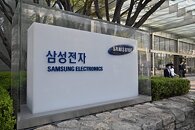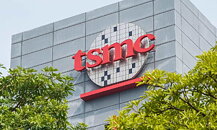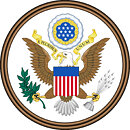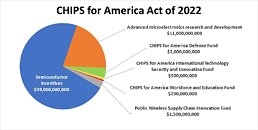T0@st
News Editor
- Joined
- Mar 7, 2023
- Messages
- 2,862 (3.75/day)
- Location
- South East, UK
| System Name | The TPU Typewriter |
|---|---|
| Processor | AMD Ryzen 5 5600 (non-X) |
| Motherboard | GIGABYTE B550M DS3H Micro ATX |
| Cooling | DeepCool AS500 |
| Memory | Kingston Fury Renegade RGB 32 GB (2 x 16 GB) DDR4-3600 CL16 |
| Video Card(s) | PowerColor Radeon RX 7800 XT 16 GB Hellhound OC |
| Storage | Samsung 980 Pro 1 TB M.2-2280 PCIe 4.0 X4 NVME SSD |
| Display(s) | Lenovo Legion Y27q-20 27" QHD IPS monitor |
| Case | GameMax Spark M-ATX (re-badged Jonsbo D30) |
| Audio Device(s) | FiiO K7 Desktop DAC/Amp + Philips Fidelio X3 headphones, or ARTTI T10 Planar IEMs |
| Power Supply | ADATA XPG CORE Reactor 650 W 80+ Gold ATX |
| Mouse | Roccat Kone Pro Air |
| Keyboard | Cooler Master MasterKeys Pro L |
| Software | Windows 10 64-bit Home Edition |
Silicon manufacturers in South Korea and Taiwan have questioned the requirements outlined in the United States Chips and Science Act - South Korean President Yoon Suk Yeol spoke on Thursday March 30, and said that there was a growing concern within companies Samsung Electronics Corporation and SK Hynix Inc. with regard to criteria for new U.S. semiconductor subsidies. Excess profit sharing is one area of contention, as the U.S. government will expect dividends to be paid under special conditions. The companies are also reluctant to meet the requirements of submitting detailed information about fab capacity and yield estimates. Leaders are pointing to the potential sensitive nature of exposing too much confidential corporate strategy to bodies in the USA, and sources within Samsung and SK Hynix are worried that budgetary planning information will be revealed in minute detail.
The CHIPS Act grants a $52 billion pool of research and manufacturing funds, and subsidies would be sourced from it. SK Hynix's parent group is considering an application in order to gain access to funding via the CHIPS Act, the SK Group has formed plans to invest $15 billion of its own money into the U.S. chip manufacturing sector - a North American location for an advanced chip packaging plant is being decided upon. Samsung has invested a substantial $25 billion into its Texas operation, so is eligible to receive U.S. government subsidies as well.



Similar concerns are shared in Taiwan, where TSMC's chairman Mark Liu told reporters at an industry event: "We are still discussing with them. There are some conditions that cannot be accepted. We hope that they can be adjusted so there will be no negative effect. We will continue to talk to the U.S. government." TSMC is investing $40 billion into a chip fabrication plant located in Phoenix, Arizona.



South Korea passed its own bit of strategic legislation this week - on Thursday it announced the formation of a bill known as the "Korean Chips Act". The nation's trade minister repeated his president's views - that the criteria for Korean manufacturers to access US funding are unappealing. This new domestic act will create a fund that will provide substantial tax incentives to South Korean manufacturers and connected strategic industries, in order to boost semiconductor production. The government had already revealed long term plans earlier in March for major investments into the private sector, and this week's decision seems to fortify those maneuvers.
View at TechPowerUp Main Site | Source
The CHIPS Act grants a $52 billion pool of research and manufacturing funds, and subsidies would be sourced from it. SK Hynix's parent group is considering an application in order to gain access to funding via the CHIPS Act, the SK Group has formed plans to invest $15 billion of its own money into the U.S. chip manufacturing sector - a North American location for an advanced chip packaging plant is being decided upon. Samsung has invested a substantial $25 billion into its Texas operation, so is eligible to receive U.S. government subsidies as well.



Similar concerns are shared in Taiwan, where TSMC's chairman Mark Liu told reporters at an industry event: "We are still discussing with them. There are some conditions that cannot be accepted. We hope that they can be adjusted so there will be no negative effect. We will continue to talk to the U.S. government." TSMC is investing $40 billion into a chip fabrication plant located in Phoenix, Arizona.



South Korea passed its own bit of strategic legislation this week - on Thursday it announced the formation of a bill known as the "Korean Chips Act". The nation's trade minister repeated his president's views - that the criteria for Korean manufacturers to access US funding are unappealing. This new domestic act will create a fund that will provide substantial tax incentives to South Korean manufacturers and connected strategic industries, in order to boost semiconductor production. The government had already revealed long term plans earlier in March for major investments into the private sector, and this week's decision seems to fortify those maneuvers.
View at TechPowerUp Main Site | Source





